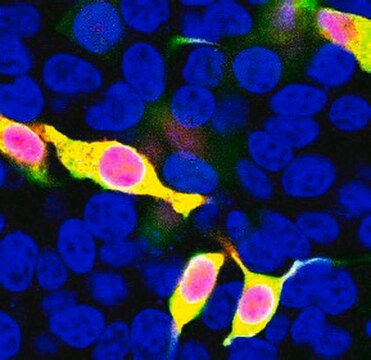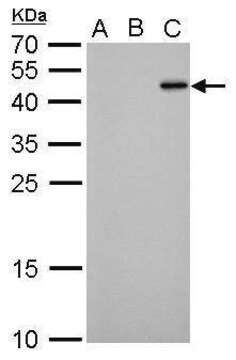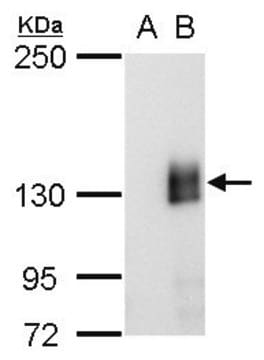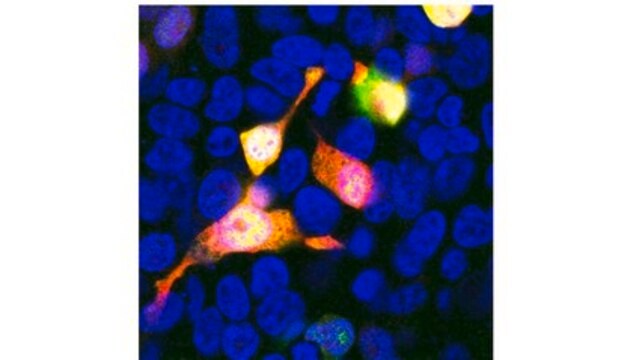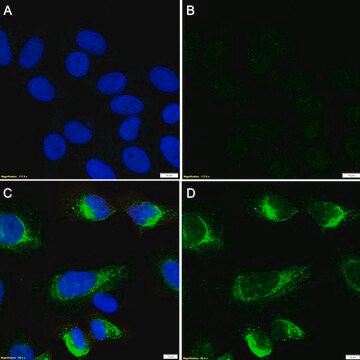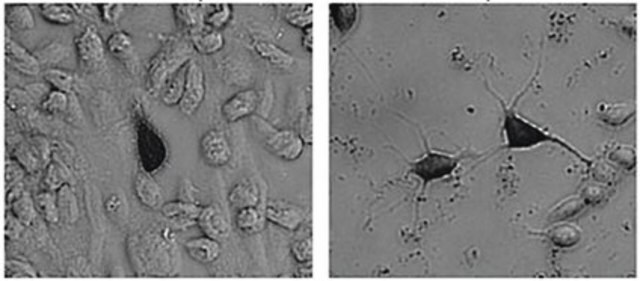AB3528
Anti-Red Fluorescent Protein Antibody
Chemicon®, from chicken
Synonym(s):
RFP
Sign Into View Organizational & Contract Pricing
All Photos(1)
About This Item
UNSPSC Code:
12352203
eCl@ss:
32160702
NACRES:
NA.41
Recommended Products
biological source
chicken
Quality Level
antibody form
purified immunoglobulin
antibody product type
primary antibodies
clone
polyclonal
species reactivity (predicted by homology)
all
manufacturer/tradename
Chemicon®
technique(s)
western blot: suitable
UniProt accession no.
shipped in
dry ice
target post-translational modification
unmodified
Specificity
Red fluorescent protein (RFP). Shows no reactivity to GFP.
Immunogen
Recombinant red fluorescent protein (RFP) highly purified by affinity chromatography on Nickel column.
Application
Anti-Red Fluorescent Protein Antibody is an antibody against Red Fluorescent Protein for use in WB.
Immunoblotting: 1:10,000-1:30,000 when detected with an anti-chicken horseradish peroxidase-conjugated secondary by ECL or by a colorimetric assay using DAB.
Optimal working dilutions must be determined by the end user.
Optimal working dilutions must be determined by the end user.
Research Category
Epitope Tags & General Use
Epitope Tags & General Use
Research Sub Category
Epitope Tags
Epitope Tags
Physical form
Format: Purified
Purified immunoglobulin - Ig fraction. Liquid. Buffer = PBS with 0.02% sodium azide
Storage and Stability
Maintain at -20°C in undiluted aliquots for up to 6 months after date of receipt. Avoid repeated freeze/thaw cycles.
Other Notes
Concentration: Please refer to the Certificate of Analysis for the lot-specific concentration.
Legal Information
CHEMICON is a registered trademark of Merck KGaA, Darmstadt, Germany
Disclaimer
Unless otherwise stated in our catalog or other company documentation accompanying the product(s), our products are intended for research use only and are not to be used for any other purpose, which includes but is not limited to, unauthorized commercial uses, in vitro diagnostic uses, ex vivo or in vivo therapeutic uses or any type of consumption or application to humans or animals.
Not finding the right product?
Try our Product Selector Tool.
Storage Class Code
12 - Non Combustible Liquids
WGK
nwg
Flash Point(F)
Not applicable
Flash Point(C)
Not applicable
Certificates of Analysis (COA)
Search for Certificates of Analysis (COA) by entering the products Lot/Batch Number. Lot and Batch Numbers can be found on a product’s label following the words ‘Lot’ or ‘Batch’.
Already Own This Product?
Find documentation for the products that you have recently purchased in the Document Library.
Chitra C Iyer et al.
Human molecular genetics, 24(21), 6160-6173 (2015-08-16)
Spinal Muscular Atrophy (SMA) is an autosomal recessive disorder characterized by loss of lower motor neurons. SMA is caused by deletion or mutation of the Survival Motor Neuron 1 (SMN1) gene and retention of the SMN2 gene. The loss of
Carlos P Descovich et al.
eLife, 12 (2023-04-06)
Oriented cell divisions balance self-renewal and differentiation in stratified epithelia such as the skin epidermis. During peak epidermal stratification, the distribution of division angles among basal keratinocyte progenitors is bimodal, with planar and perpendicular divisions driving symmetric and asymmetric daughter
Zhongan Yang et al.
BMC developmental biology, 7, 97-97 (2007-08-22)
GATA-2 is a transcription factor required for hematopoietic stem cell survival as well as for neuronal development in vertebrates. It has been shown that specific expression of GATA-2 in blood progenitor cells requires distal cis-acting regulatory elements. Identification and characterization
Grigori Guitchounts et al.
Neuron, 108(3), 512-525 (2020-08-14)
Animals actively sample the sensory world by generating complex patterns of movement that evolve in three dimensions. Whether or how such movements affect neuronal activity in sensory cortical areas remains largely unknown, because most experiments exploring movement-related modulation have been
Amrita A Iyer et al.
eLife, 11 (2022-11-30)
Reprogramming of the cochlea with hair-cell-specific transcription factors such as ATOH1 has been proposed as a potential therapeutic strategy for hearing loss. ATOH1 expression in the developing cochlea can efficiently induce hair cell regeneration but the efficiency of hair cell
Our team of scientists has experience in all areas of research including Life Science, Material Science, Chemical Synthesis, Chromatography, Analytical and many others.
Contact Technical Service